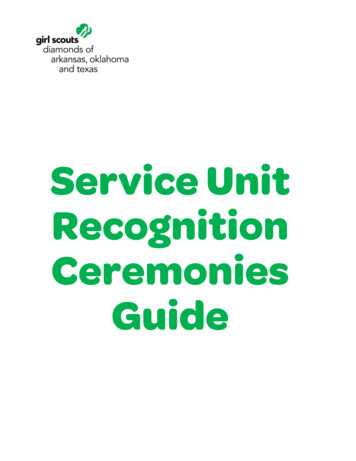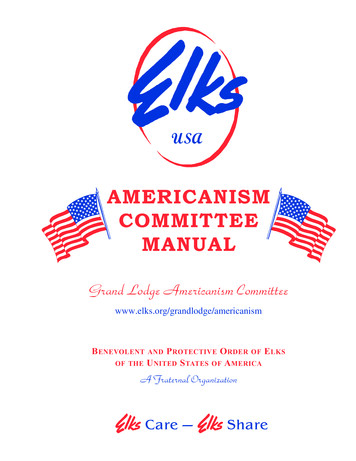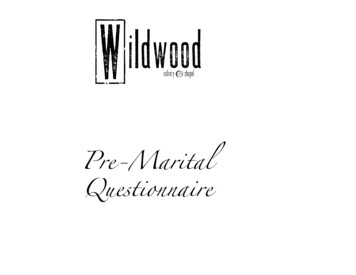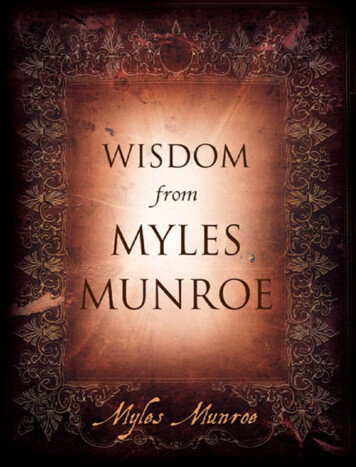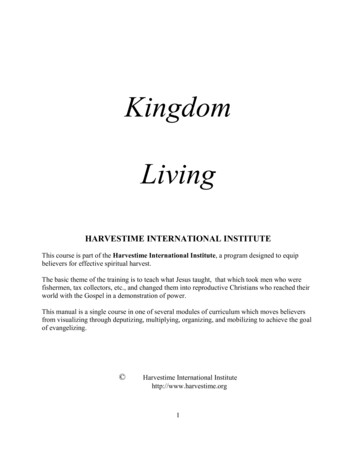
Transcription
APPENDICESArticles of Interest to Court HeraldsMany of the articles in the Appendices of this book are taken from the West Kingdom Herald’sHandbook, some are modified a tad. Below is a table of contents for this section of the West KingdomCeremony Book.How to Organize a CourtOn the Practical Conduct of Court . 1On the Art/Science of Court Heraldry . 4How to Start and End a Court . 9Seating at Court and Banquet . 15Order of a ‘Grand March’ . 19How to Write a Ceremony . 21Simple Ceremonies for Small Tournies . 25New Member Packets, Orders of PeerageChivalry . 27Laurel . 33Pelican . 39Defense . 45(Spring 2015) Ceremony Book of the Kingdom of the West – ArticlesPage A.i
Hic Nihil DeficitPage A.ii(Spring 2015) Ceremony Book of the Kingdom of the West – Articles
ON THE PRACTICAL CONDUCT OF COURTby Eilis O’Boirne(The following are notes on the mechanical details which must be attended to, rather than aphilosophical treatise. I will speak primarily of Kingdom Courts, as these tend to be most complex, butthe information herein will also apply to Principality and Baronial Courts, with appropriate changes.)CONGRATULATIONS!!! You’ve been asked by Their Majesties, or appointed by Banner, to conduct aCourt. The first step is to find out when the Court you are responsible for is scheduled to be held. Theanswer may be precise (10:00 a.m. Sunday) or it may be vague (“After the Peerage meetings”). Eitherway, it is now your responsibility to be ready for the Court whenever Their Majesties are.Speak to Banner and arrange a Second, or “back-up” herald, for the Court. Depending on yourexperience, this will be either one of the more-skilled Court heralds or a trainee. The functions of thisSecond will be gone into later in detail. Arrange with your Second to meet with you approximately onehour before Court. If you are not familiar with the Kingdom ceremony book, ask one of the SeniorHeralds to go over it with you, and read through any ceremonies you may be asked for.One hour before Court is scheduled, put on a tabard and go (with a notebook or clipboard, and withyour Second, also in regalia) to Their Majesties, and confirm that there has been no significant changein the time set for Court. At this time, you can ask Their Majesties if they have any business for Court,and obtain the promissories for any awards they will be granting. (If Their Majesties have not had thepromissories done in advance, this might give the Scribes time to prepare them.) You should also askwhether various of the conventions used for Court (which are covered below) will apply. Write anyRoyal business in your notebook, and put the promissories in a safe place. Thank Their Majesties, andtell them that you will return to review the collected business with them later.Arrange for it to be announced that you are taking Court business in a fixed location. The herald’spavilion is generally best, as it is usually very busy around the Royal pavilion. Go to your chosenlocation and stand or sit in a place where you are visible. When people come to you with business forCourt, make sure that you get enough information that Their Majesties can decide whether they wishthe item to be included in Court, and that you can make the announcement, if necessary. Write legiblyenough that someone else can read the information if necessary. Inform the people who bring businessabout the Court conventions being used that day, and further inform them that any business scheduledfor Court may be cut or altered at Their Majesties’ whim. If there are to be Peerages given, with noscrolls available, consult the Armorial to determine the correct blazon of the Peer’s arms.One half hour before Court is to begin, have a final call for business. At this time, you should check withBanner or the senior Herald available as to whether there are scrolls which are to be distributed at thisCourt. You should make sure you have all the “props” you need: Kingdom tabard, a respectable tabardfor your Second, the promissories, the Kingdom ceremony book, etc. Collect your Second, your“props”, and a large glass of water, and go to Their Majesties.Review the business you have collected with Their Majesties, cutting and altering it as They command.Add any further business as They may have, and ask whether They have any requests as to theordering of Court or the grouping of business. Thank Them and go to a quiet place with your Second.You are going to do something that will make the difference between a smooth and impressive Courtand a flop -- you are going to order the business for Court. (This paper will not address the question ofwhat business should come when, as that is a question of philosophy.)There are several mechanical ways to order business. Each has advantages and disadvantages, andyou should choose the one which works best for you.(Spring 2015) Ceremony Book of the Kingdom of the West – ArticlesPage A.1
On the Practical Conduct of Court, Cont.1) You can write each piece of business on an index card, and shuffle them into a pleasing pattern.This system offers great flexibility, but if you drop the cards you are in trouble.2) You can rewrite the business from the “collection notes” to a new sheet, arranging it in what youfeel is the best order and writing in the wording you want to use. This is probably the bestmethod for the inexperienced herald, but it tends to create a certain inflexibility andunwillingness to deal with changes.3) You can rewrite, in fuller form, the business from the “collection notes”, grouped into categories:Announcements, Presentations, Competitions, Awards, etc. You can then select from thesecategories as appropriate, judging the mood of the Royalty and the populace. This may be thebest method for moderately-experienced Court heralds, as it gives both organization andflexibility.4) You can take the “collection notes” and write numbers and notes in the margin, ordering theCourt in your head. This works only if you know what you are doing, but it offers maximumflexibility and can produce spectacular courts.Whatever method you use, it is not a bad idea to draw a pencil line through each piece of business as itis completed. This provides a check that you have done everything, and stops you from inadvertentlymaking the same announcement twice.After the close of Court, ask Their Majesties if they have any comments on the conduct of Court, andthank them for allowing you to be of service.SECONDS: If you are an experienced Court herald, your Second is there to be an extra pair of hands,and to learn how to conduct a Court suitable to the dignity of Their Majesties. If you are aninexperienced Court herald, your Second is there to give you the benefit of his experience, and tostiffen your jelly-like spine. In both cases, the Second is there to take over in emergencies, and to do allhe can to make the Court flow smoothly.The major duties of a Second are:1)to receive gracefully anything handed to him (or flung at him) by the Court herald.2)To shuffle books and papers in a non-obtrusive manner.3)To be ready to step in and take over if the Court herald’s voice vanishes or the Court heraldis suddenly called forward to receive an honor from the Crown. Other duties depend on thelength of the Court, the business being conducted, and the identity of the Court herald andTheir Majesties. Some Royalty do not like “rotating heralds”, so the Second can not bebrought in to do some of the announcements and awards. Other Court heralds will ask theirSeconds to be “Queen's herald”, and to stand by Her Majesty with the ceremony book andherald any “Queen’s business”. “Active participation” by a Second is not a right, but aprivilege.Since a Second must be ready to step on and take over the conduct of Court on no notice, you must beaware of everything that has been planned for Court, and you should make sure you can read the Courtherald’s writing and that you understand how the Court has been ordered. You must stay aware ofeverything that happens, including unexpected reorganizations which sometimes happen. If you muststep in, the transition should be as smooth as possible.CONVENTIONS: Check with the Royalty involved to see which of these are in effect at any givenCourt. For some Reigns, there are “blanket” conventions, and Banner should inform you of those, but itis always courteous to confirm these with Their Majesties. These are possible conventions:Page A.2(Spring 2015) Ceremony Book of the Kingdom of the West – Articles
On the Practical Conduct of Court, Cont.1)There will be no announcements taking place for events in upcoming weeks, except forthose where there has been some drastic change to published information. (or) Eventannouncements are acceptable, but they will all be made by the local herald. (or) It isacceptable for those who wish to make their own event announcements to do so. (Acorollary to this is that, even if it is acceptable for people to make their own announcements,an announcement by the herald may be more audible.)2)There will be no presentations in Court, except to the Regalia. (or) Personal presentationsto Their Majesties will be acceptable, if they are suitable. (No funny T-shirts.)3)The herald will make all the Officers' announcements. (or) Officers may make their ownannouncements.The “harsher” forms of these conventions have come into use in an attempt to make Courts moreaudible and less boring. They also make the timing easier to control.HELPFUL HINTS:Wear comfortable shoes. Sounds really obvious, doesn't it? Try standing in one place for an hourwithout fidgeting. Now go put on the comfortable shoes.Dress appropriately. The Kingdom tabard is vivid, and looks best over solid-colored, simple clothing. Itis also very warm. Your best bet may be a simple undertunic -- as long as it isn’t transparent.Make sure you have water available. Your Second can be made responsible for keeping the glass filledfrom a jug you have secreted in the Royal pavilion, and for handing it to you when there is a break inthe Court.(Spring 2015) Ceremony Book of the Kingdom of the West – ArticlesPage A.3
ON THE ART/SCIENCE OFCOURT HERALDRYMacsen Fidelis, OL (October 12, AS XX)(The following are my personal feelings and opinions and do not represent any official policy of theS.C.A., Inc., the College of Arms of the SCA, the Kingdom of the West, or of the College of Heralds ofthe Kingdom of the West. M.F.)PART I - DEFINITIONSA competent Court herald can be heard and understood across the entire area occupied by the Court.Obviously, outdoor Kingdom Courts will require more projective ability than smaller Courts held indoors.Almost anyone can be trained to be heard over the average outdoor Court area, and absolutelyeveryone can be trained to be understood for as far as they can be heard. To be a competent Courtherald, then, is within the reach of almost everyone sufficiently interested to apply themselves by studyand practice. The competent Court herald is familiar with all of the ceremonies encountered at Courtand can perform them without stumbling over the words. The competent Court herald is sure of thepronunciation of all names to be used at Court, and if unfamiliar with any names, has written themphonetically on the Court notes. Once again, then, virtually anyone willing to apply themselves to work,study and practice may become a competent Court herald.The good Court herald has a sense of theatre. He or she understands that presence, pace, theme andvariation all play a part in elevating business into ceremony and transforming the ordinary intoinspirational. The good Court herald is prepared with the business for Court well in advance of the timefor Court, and arranges business so that announcements, presentations, awards, peerage elevations,and other items are mingled so as to present an interesting variety throughout the Court. The goodCourt herald has a number of vocal expressions, shifting from the smooth, to the formal, from theprepared ceremony to the impromptu announcement and back, always audible and comprehensible.The great Court herald has the ability to be humorous without crassness, to be dignified withoutpomposity, to be gracious without fawning, to be entertaining without becoming the center of attention.He or she is aware of the personalities and moods of royalty, and becomes the foil of the humorousKing, the flowery tongue of the retiring King, and the serious face of the angry King. The great Courtherald has coached new subjects for their appearances at Court. He or she always has materialprepared to cover eventualities such as changes or delays ordered in the middle of Court by royalty, orthe arrival in mid-Court of foreign royalty. The great Court herald knows the likes and dislikes of royaltyand courteously prevents the Queen from being presented with flowers to which she is violently allergicand always clears questionable presentations with Their Majesties before Court begins. The greatCourt herald errs on the side of caution and limits himself to one (well, maybe two) bad puns per Court.Page A.4(Spring 2015) Ceremony Book of the Kingdom of the West – Articles
On The Art/Science of Court Heraldry, Cont.PART II - COURT CHECKLIST1. Start at least 1 hour before Court to get business. (At Twelfth Night, start a week early - callTheir Majesties, Their Royal Highnesses, Their Highnesses and the Great Officers on thetelephone and inquire of their plans).a. Start with Their Majesties - this will give you an idea of how long the Court will be - andwill start the process of Their preparing for Court.b. Be sure to get the proper pronunciations of people's names - devise and use your ownsystem of phonetic notation.c. Find out what is being presented - you are NOT being presumptuous - it is your JOB toknow what is going to happen at Court, including exactly what is in those baskets andboxes.d. Check with anyone wishing to perform or entertain at Court to see if they have TheirMajesties' approval. Most past royalty has severely restricted performing at Court. Checkwith Their Majesties.e. Be sure that the person(s) understand what is expected of them in terms of behavior.Newcomers may ask for guidance. New groups, especially, may want hints on their first“public” appearance.2. Organize the Court. Try taking down items on 3x5 cards that are punched to fit in a smallnotebook, and then arrange them into the order desired.a. Make a mixture - distribute announcements throughout the Court, separate the awardsand presentations from each other.b. Be careful of logistics - a group presentation will require more time to clear the centralarea than one or two persons - have two or three announcements in a row to cover theirwithdrawal.c. Build to a conclusion. Elevations to the peerage belong towards the end of the Court and should not be immediately followed by announcements about garbage disposal.3. Review the Court with Their Majesties - the bigger/longer the Court, the harder this will be - andthe more important it will be.a.Be sure that all of Their Majesties business is on the Court notes.b.Be sure that Their Majesties are aware of any special occurrences, such as Courttime requested by a Principality, or the appearance of an ambassador.c.Go over any questionable items - such as entertainment or any presentations of“humorous” items.d.Give Their Majesties an opportunity to review Their parts in any ceremoniesscheduled for the Court.4. Make sure all necessary items are on hand at the thrones:Scrolls and promissories (work with the Scribes)Regalia and tokens for ceremonies (work with members of the Court)Ceremony bookWater (not booze - that comes after a job well done)Herald's cloak or tabardCourt notes5. Review the Court notes with your second, who, ideally, was involved with all of the precedingactivities.a. Now is the time to be sure that you can quickly find all the ceremonies in the book (largepaper clips are real handy at this point).b. Be sure that your second knows when you will be trading the ceremony book for a scroll,etc.c. Be sure that necessary notes are tucked into the ceremonies (such as blazons for newpeers).(Spring 2015) Ceremony Book of the Kingdom of the West – ArticlesPage A.5
On The Art/Science of Court Heraldry, Cont.6. Do it. Carefully. Smoothly. Elegantly.7. Review the Court with someone whose judgement you trust.Note down any things that caused problems (or appeared to), as well as any things that wentespecially well.8. Add your own items to remember:Page A.6(Spring 2015) Ceremony Book of the Kingdom of the West – Articles
On The Art/Science of Court Heraldry, Cont.PART III - GENERAL PREPARATIONSome thoughts on ways to enhance your abilities as a Court herald. Heralds are made, not born.Personal style and taste are developed, not inherited. Anything that stretches your mind, challengesyour imagination and contributes to your sense of style, of bravura, of art, of savoir faire will contributeto your abilities as a Court Herald.Read a book. The herald who knows something about anything is one up on the uninformed. Try ahistory book, especially from our period, especially one that addresses the workings of the Courts andgreat houses. Try Barbara Tuchman’s A Distant Mirror, for example.Take a speech class. Learn how to improve and control your diction, volume, pronunciation, projectionand articulation. Or join a local Toastmaster’s International club. Or join your local theatre group(caution!!! this is a major commitment of time for most people).Watch the good ones, people like Baron Gerhard Kendall of Westmoreland, if you are fortunate enoughto be around on one of his rare visits - a man who can successfully combine the aspects of warrior,courtier, noble and jester is rare indeed.Sandpaper the end of your nose. Not really, but do try to stay sensitive to what others are doing andsaying to you.Read a book. Try a book of poetry, especially one from the period or shortly thereafter. Read it OUTLOUD!Watch movies, especially period costume dramas. Keep a close eye on how the really good actorsmove and wear their costumes. Learn how to REALLY wear a cape. Listen to Burton’s and Hepburn’sand O’Toole's and Connery’s and York’s and Heston’s and whoever’s DELIVERY.Steal shamelessly - not material, but STYLE. Find a herald who does things you like, and try to dothings in his or her style.Gargle with pebbles. Not really, but Demosthenes had the right idea: find your vocal weaknesses andwork hard to get rid of them.Read a book. Try a book of plays. Try Shakespeare. Read it OUT LOUD.When you think you're about ready, volunteer to second at Court. If possible, try to work with a heraldyou have chosen as a model. In all events, pay careful attention to the preparation and presentation ofCourt, and be very sensitive to the byplay around the thrones, as well as the quiet interchange betweenKing and herald. Next time, it may be you up there.Go to church. Or synagogue. Or mosque. As a believer or not. Look at the CEREMONY.Study a foreign language. Be especially aware of old phrases, such as “Vuestra Merced”, whichbecame the modern “Usted” in Spanish. Use honorifics and greetings to persons whose persona usesthe language.Offer your services to royalty outside of Court. If the Queen is to make a Royal Progress, offer yourservices as Herald. This is for the advanced student, by the way, as you may find yourself introducing200 strangers to Her Majesty. Along the same lines, but for the intermediate student, volunteer to helpwith the introductions at Grand March (see the Senior Herald on duty).(Spring 2015) Ceremony Book of the Kingdom of the West – ArticlesPage A.7
On The Art/Science of Court Heraldry, Cont.Read a book. Try mythology. You can be loaded with analogies, similes and comparisons the next timeyou need one. Which will play better at Court, “a veritable Hercules!”, or “a really strong dude”?Go to the theatre. Try a good one. Watch the projection of voice (and emotion). Go home and practice.Be very careful with humour. Better than 80% of the populace, and 100% of the royalty had better thinkyou’re funny, or you could be in trouble. While a well-placed theatrical aside or response to a profferedstraight line is beneficial, the herald is NOT a stand-up comedian or jester. Humour must not beintrusive.Practice all the time. Try being flowery without being saccharine, formal without being stodgy. A superbpractice piece that will also benefit everyone you practice on is a proper, formal introduction ofsomeone you know to someone you don’t know.Read a book. Please.Page A.8(Spring 2015) Ceremony Book of the Kingdom of the West – Articles
HOW TO START AND END A COURTWilliam the Lucky (May, XXI)The beginning of a court (with or without an entrance procession of those presiding) usually follows arelatively set formula. The formula serves to get the populace ready to listen, as well as adding to thegeneral pomp and circumstance of the occasion. If there is no entrance procession, the court will beginwith those presiding seated at the front.WHEN TO PROCESS:1In the last analysis, the Royalty will process if They feel like it. However, there are times when it isappropriate, and others when it is not (just in case They ask your advice): It is most appropriate for the first court of an event (but not, of course, necessary). It is not usually as appropriate at the later courts of an event. However, if a special ceremony isto occur at a later court (especially if is the only business of that court), a procession can add tothe pomp and circumstance of the occasion. Also, if some of the Royalty arrived after first court,this may be the only opportunity that they will have to process.The purpose of the procession is to let everyone get a close-up look at their Sovereigns and, in effect,introduce Them to anyone who does not already know Them. It also allows the Princes and Princessesto be presented to the Crown if They are at a Kingdom event, and lets Them greet the King and Queenif They attend a Principality or local event.WHO PROCESSES: Kingdom EventsIf the King and Queen wish to process, all of the Princes and Princesses who are present willprocess also. (Exceptions may be made, but usually only because someone has a leg in a castor is otherwise incapable of walking.) With each set of Royalty may go various members ofTheir official household: banner bearers, ladies-in-waiting, etc.; the size and number varies fromone set of Crowned Heads to the next, but They generally work out what They want forThemselves.If the King and Queen do not wish to process, They may still ask that the Princes andPrincesses process in and be presented. Generally, either all of the Princes and Princesses willprocess, or none will.In addition, any visiting Royalty may enter in procession. They will usually come after thePrinces and Princesses, because They are then able to meet all of Their hosts. (They should beannounced as ‘Xxxx and Yyyy, King and Queen of Zzzz’, or ‘Aaaa and Bbbb, Prince andPrincess of Pppp.’)Ambassadors from other Kingdoms may also be part of an entrance procession. (They areannounced as ‘Lord (Sir, Countess, etc.) Ffff the Ggggg, Ambassador from Their Majesties ofXxxx’.)1pro cess' (verb): To enter court in a procession. Usually prior to the start of business, although it can beused for marching in a Grand March (which is then the first item of business).(Spring 2015) Ceremony Book of the Kingdom of the West – ArticlesPage A.9
How to Start and End a Court, Cont. Principality Events:If the Prince and Princess of the Principality wish to process, then all of the Royalty present willprocess. (In exceptional circumstances, the King and Queen may not process, even though thePrince and Princess are doing so.) However, even if the Prince and Princess do not wish toprocess, the other Royalty present may process, including the King and Queen, if They arepresent and wish to do so.STARTING COURT:(The following are basic guidelines, not fixed ceremonies. Be sure you understand what the Royaltywants before starting. When in doubt, ask them!) Kingdom Events: Determine if Their Majesties wish to process in, or if They will start Courtalready seated on Their Thrones. Processing in: If They are processing in, the populace should be called to assemble beforethe Thrones. Their Majesties (together with any of the Territorial Princes and Princesseswho are present) will start at the back of the gathered populace and to one side. When Theystep forward, this is your cue to say:‘All rise for Their Majestiesand, King and Queen of the West.’Once They are settled before the Throne (but probably not seated), the first of the Princesand Princesses will start forward (by precedence of Principality: Mists, Cynagua, Oertha).Each should be announced:‘Their Highnessesand, Prince and Princess of.’It is nice if you can give each set time to greet Their Majesties. Then announce the next setin the same fashion. When all of the Princes and Princesses have been announced, TheirMajesties and Their Highnesses will sit. If the Sovereign does not say so at this point, ask(softly), ‘Your Majesty, does the populace have Your leave to be seated?’ Assuming theanswer is affirmative, inform the populace:‘You have Their Majesties leave to be seated and make yourselves comfortable.’or‘You have Their Majesties leave to draw nigh and be seated, leaving an aisle.’(Avoid saying ‘be seated and draw nigh.’ It causes giggles from everyone who can picturethe populace sitting and then sliding forward along the ground.)Then proceed to the first item of business for the court. Starting with Royalty in Place: When the populace has gathered and Their Majesties areready, say:‘Pay heed to the Court of Their Majestiesand, King and Queen of the West.’(The populace will usually rise.) If the first item of business is a procession of Princes,visiting Royalty, etc., then proceed as outlined above. Otherwise, when Their Majesties havegiven the word, say:‘You have Their Majesties leave to draw nigh and be seated, leaving an aisle.’Page A.10(Spring 2015) Ceremony Book of the Kingdom of the West – Articles
How to Start and End a Court, Cont.Then proceed to the first item of business for the court. Principality Events Processing in: If They are processing in, the populace should be called to assemble beforethe Thrones. The Prince and Princess of the Principality holding the event should process infirst even if the King and Queen are present, followed by Their Majesties and any of theother Territorial Princes and Princesses who are present. When the Prince and Princessstart forward, this is your cue to say:‘All rise for Their Highnessesand, Prince and Princess of.’Once They are settled before the Throne (but probably not seated), the King and Queen (ifpresent) should be announced:‘Their Majestiesand, King and Queen of the West.’After the Prince and Princess have welcomed the King and Queen, and they have all gottensettled, the first of the other Princes and Princesses will start forward (by precedence ofPrincipality: Mists, Cynagua, Oertha). Each should be announced:‘Their Highnessesand, Prince and Princess of.’When all of the Princes and Princesses have been announced, Their Majesties and TheirHighnesses will sit. If the Sovereign does not say so at this point, ask (softly), ‘YourHighness, does the populace have Your leave to be seated?’ Assuming the answer isaffirmative, inform the populace:‘You have Their Highnesses leave to be seated and make yourselves comfortable.’or‘You have Their Highnesses leave to draw nigh and be seated, leaving an aisle.’Then proceed to the first item of business for the court. Starting with Royalty in Place: When the populace has gathered and Their Highnesses areready, say:‘Pay heed to the Court of Their Highnesses.’and, Prince and Princess of(The populace will usually rise.) If the first item of business is a procession of visitors, thenproceed as outlined above. Otherwise, when Their Highnesses have given the word, say:‘You have Their Highnesses leave to draw nigh and be seated, leaving an aisle.’Then proceed to the first item of business for the court. Baronial Events:If the King and Queen (or the Prince and Princess) are present, They should hold any court thatis being done. The function of the Territorial Baron and Baroness is to provide a ceremonialfocus in Their absence. Therefore if there is no Royalty present, the Baron and Baroness mayhold court.It may happen that the only business to be done is strictly Baronial (e.g., the Baronialchampionship or various Baronial orders). Opinions differ as to whether it is appropriate for the(Spring 2015
(Spring 2015) Ceremony Book of the Kingdom of the West – Articles Page A.i APPENDICES Articles of Interest to Court Heralds Many of the articles in the Appendices of this book are taken from the West Kingdom Herald’s Handbook, some are modified a tad. Below is a table of contents for this se
